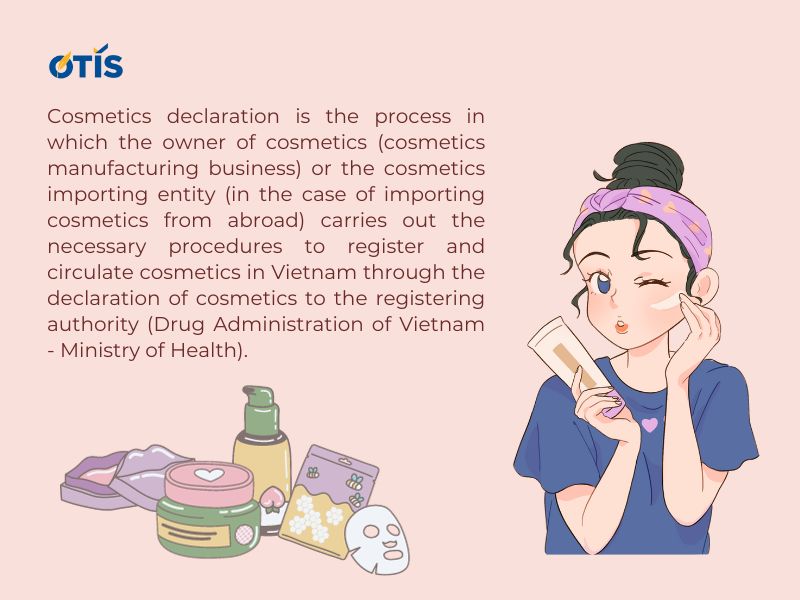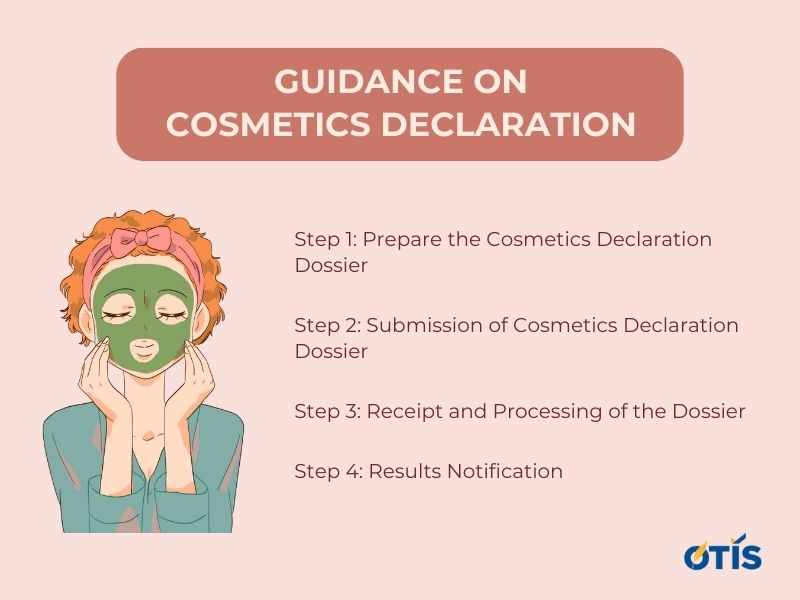Cosmetics are an essential need in life, especially for those who prioritize beauty. However, these products directly impact the health and beauty of consumers. Therefore, the law specifies that for cosmetics to be circulated in the market, they must undergo the cosmetics declaration procedure. In the following article, OTIS LAWYERS will provide information about cosmetics declaration for readers to refer to and understand
What is a cosmetics declaration?
Cosmetics declaration is the process in which the owner of cosmetics (cosmetics manufacturing business) or the cosmetics importing entity (in the case of importing cosmetics from abroad) carries out the necessary procedures to register and circulate cosmetics in Vietnam through the declaration of cosmetics to the registering authority (Drug Administration of Vietnam – Ministry of Health). Therefore, cosmetics declaration can be considered a mandatory procedure before businesses, organizations, or individuals can introduce cosmetics to the market.

Conditions for Cosmetics Declaration
To proceed with cosmetics declaration, both the declared product and the declaring entity must meet the following conditions:
- Business Line Conditions: The declaring entity must be engaged in the business activities of buying and selling (wholesale or retail) cosmetics, as well as cosmetics import and export.
- Production License Conditions: For domestically manufactured cosmetic products, the declaring entity must submit the production license for cosmetics issued by the authorized agency.
- Product Testing: For domestically manufactured products, during the cosmetics declaration procedure, the product must undergo testing at a testing center to verify its cosmetic components.
- Conditions for Imported Products: Imported products eligible for declaration must be accompanied by a certificate of free circulation in the country of origin and an authorization letter from the manufacturer to the distributor in Vietnam for the declaration on their behalf.
- Declared Product Conditions: The declared cosmetic product must be within the list of permitted products for declaration according to legal regulations. The components of the product must meet the required standards and pose no harm to users.
List of Cosmetics Requiring Declaration
The mandatory list of cosmetic products that must undergo cosmetics declaration before being circulated in the market includes:
- Creams, emulsions, lotions, gels, or oils for skin application.
- Face masks (excluding chemical peel products).
- Color cosmetics (liquid, creamy, powder).
- Face powder, post-bath powder, hygiene powder, etc.
- Bath soaps, deodorant soaps.
- Perfumes, toilet waters for personal hygiene.
- Products for bathing or shampooing (salts, soaps, oils, gels, etc.).
- Hair removal products.
- Deodorants and antiperspirants.
- Hair care products.
- Hair dyes and hair bleaches.
- Hair waving, straightening, and fixing products.
- Hair styling products (lotions, gels, waxes).
- Shaving products (creams, soaps, lotions, etc.).
- Makeup and makeup removers for face and eyes.
- Lip products.
- Products for oral and dental care.
- Products for nail care and decoration.
- External hygiene products.
- Sunscreen products.
- Skin lightening products without sunbathing.
- Skin whitening products.
- Anti-wrinkle products.
Guidance on Cosmetics Declaration

Step 1: Prepare the Cosmetics Declaration Dossier
For domestically manufactured cosmetics, you need to prepare a dossier including the following documents:
- Product declaration form for cosmetics (02 copies) with declaration data (soft copy of the declaration form).
- Authenticated copy of the business registration certificate of the entity or individual responsible for introducing the product to the market. In cases where the entity or individual introducing the product to the market is not the manufacturer, an authenticated copy of the business registration certificate of the manufacturer is required.
- Original or authenticated copy of the authorization letter from the manufacturer or owner of the product authorizing the entity or individual responsible for introducing the product to the market and distributing the cosmetic product in Vietnam (applicable to domestically manufactured cosmetics where the entity or individual introducing the product to the market is not the manufacturer).
- Testing certificate and formula of the declared cosmetic product.
- Quality standards of the cosmetic product and testing methods.
- Product testing form for cosmetic products.
- Technical data or clinical data to prove any specific functions of the product (if applicable).
For imported cosmetics, you need to prepare a dossier including the following documents:
- Product declaration form for cosmetics (02 copies) with declaration data (soft copy of the declaration form).
- Authenticated copy of the business registration certificate of the entity or individual responsible for introducing the product to the market. In cases where the entity or individual introducing the product to the market is not the manufacturer, an authenticated copy of the business registration certificate of the manufacturer is required.
- Authorization letter from the manufacturer or owner of the product authorizing the entity or individual responsible for introducing the product to the market and distributing the cosmetic product in Vietnam. This authorization letter must be authenticated and legalized by the consular authority as per the legal requirements, unless exempted under international agreements of which Vietnam is a member.
- Certificate of Free Sale (CFS): This is applicable only for the declaration of imported cosmetic products and must meet the following requirements:
In the case of declaring cosmetic products imported from countries that are not members of the Comprehensive and Progressive Agreement for Trans-Pacific Partnership (CPTPP), the Certificate of Free Sale (CFS) must meet the following requirements:
- The CFS issued by the country exporting cosmetics to Vietnam must be the original and currently valid. If the CFS does not specify an expiration date, it must be issued within 24 months from the date of issuance.
- The CFS must be authenticated and legalized by the consular authority as per the legal requirements unless exempted under international agreements of which Vietnam is a member.
- The CFS must contain minimum information as per the regulations in Article 36 of the Law on Foreign Trade Management and Clause 3 of Article 10 of Decree No. 69/2018/ND-CP dated May 15, 2018, of the Government detailing a number of articles of the Law on Foreign Trade Management.
For cosmetic products declared, circulated, and exported from CPTPP member countries, no CFS is required.
Scientific documentation or an explanatory document from the manufacturer regarding the functions and components of the cosmetic product. In cases where the components or functions are unique, they must be clarified according to the requirements of the registering authority.
Step 2: Submission of Cosmetics Declaration Dossier
The cosmetics declaration dossier, compiled as one set, is directly submitted or sent by mail to the competent state management agency according to the following guidelines: For imported cosmetics: The organization or individual responsible for introducing the product to the market submits the cosmetics declaration dossier to the Drug Administration – Ministry of Health.
For domestically manufactured cosmetics: The organization or individual responsible for introducing the product to the market submits the cosmetics declaration dossier to the Department of Health where the manufacturing facility is located. Cosmetics produced and packaged for import as finished products are considered domestically manufactured.
For cosmetics traded within the industrial and commercial zone of the Moc Bai Border Gate Economic Zone, Tây Ninh Province, the declaration is made at the Management Board of the Moc Bai Border Gate Economic Zone. For cosmetics traded within the Lao Bao Special Economic and Commercial Zone, Quang Tri Province, the declaration is made at the Management Board of the provincial Economic Zone.
Step 3: Receipt and Processing of the Dossier
Within 3 working days from the date of receiving a valid cosmetics declaration dossier and the prescribed declaration fee, the competent state management agency is responsible for issuing the product declaration form for cosmetics.
If the declaration dossier does not meet the requirements of Circular 06/2011/TT-BYT, within 5 working days from the date of receiving the dossier, the receiving agency notifies the organization or individual of the specific deficiencies and requests them to revise and supplement the dossier.
If the revised and supplemented dossier still does not meet the requirements of Circular 06/2011/TT-BYT, within 5 working days from the date of receiving the additional dossier, the receiving agency notifies the organization or individual in writing that the product will not be granted a cosmetics declaration for this submission.
Within 3 months from the date of issuing the written notification mentioned above, if the competent state management agency does not receive the additional dossier from the organization or individual named in the declaration, the declaration becomes invalid. In this case, if the organization or individual wishes to continue the declaration, they must submit a new dossier and pay a new fee as per regulations.
Step 4: Results Notification
After completing all the procedures outlined above and being issued the product declaration form for cosmetics, the organization or individual responsible for introducing the cosmetic product to the market is allowed to legally circulate the cosmetic products they manufacture, trade, or distribute.
For any questions or comments, please contact:
OTIS AND PARTNERS LAW FIRM
Office address: K28 – Group K, Lane 68 Trung Kinh, Yen Hoa Ward, Cau Giay District, Hanoi
Email: info@otislawyers.vn
Hotline: 0987748111


 Tiếng Việt
Tiếng Việt 한국어
한국어 中文 (中国)
中文 (中国)